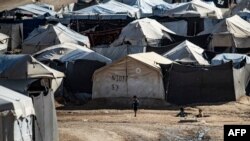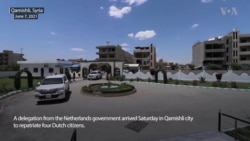A senior government delegation from the Netherlands arrived in Qamishli, a predominantly Kurdish city in northeastern Syria, to take back four Dutch nationals tied to the Islamic State.
They included the wife of an IS fighter and her two children along with an orphan child whose parents died in the country.
"I'm here today with a clear and well-defined mandate to receive in the care of our mission a small number of Dutch nationals," Emiel De Bont, the Dutch Special Envoy to Syria, told reporters in a joint press conference along with Abdul-Karim Omar, a senior Kurdish official with the ruling Syrian Democratic Forces (SDF) in northeast Syria.
U.S.-backed SDF played a critical role in the defeat of the IS terror group's self-described caliphate in northeastern Syria, leading to the capture of thousands of IS family members, including women and children, now being held at the al-Hol camp in Syria.
The Dutch repatriation this weekend brought the number of people who have returned to their countries this year to 660, according to Syria-based Rojava Information Center (RIC).
"This year is set to surpass any other year since 2017. The highest rate of repatriations had occurred in 2019, when 736 ISIS affiliates returned," RIC tweeted.
The local watchdog reported that the SDF is currently guarding thousands of IS women and children, including 30,000 Iraqis and more than 8,000 foreign nationals from various countries.
SDF official Omar commended the Netherlands for easing the burden on his under-resourced administration.
"This does not mean these people have not committed serious crimes. Those countries that want their individuals back will try them at their own courts," Omar said.
The Kurdish-led force receives financial and military support from the U.S. and other nations, which are part of the coalition to fight IS. It reportedly also relies on selling oil to provide salaries to its fighters and civil servants in a country where the currency has been significantly devalued since the Syrian civil war broke out a decade ago.
This is the second time that the Netherlands has publicly repatriated its nationals from Syria. In 2019, it admitted two children.
Western governments have largely remained reluctant or selective in taking back their citizens who are family members of IS fighters.
Experts say trying them in Western courts can be a challenge due to difficulties in gathering concrete evidence on potential crimes imprisoned IS fighters and their family members may have committed while the terror group controlled large swaths of land across Iraq and Syria.






